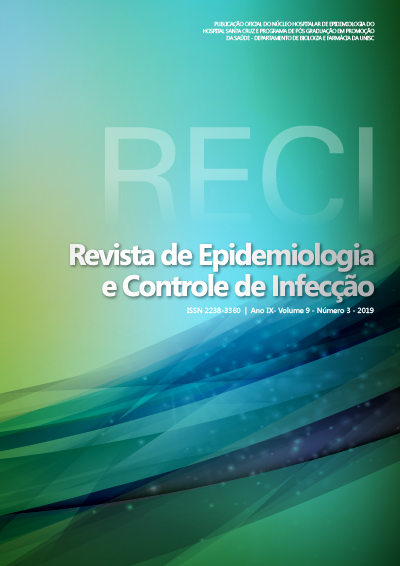Infection by Giardia duodenalis among school-age children in the south of Mato Grosso
DOI:
https://doi.org/10.17058/reci.v9i3.13207Keywords:
Prevalence. Child. Giardiasis. Risk factors.Abstract
Background and Objectives: Giardiasis represents a health public problem that may damage the physical and mental development, particularly of children. Therefore, the importance of performing the parasitological evaluation of this population and its determinants is highlighted. Thus, this study aimed to evaluate the prevalence and factors associated with Giardia duodenalis infection in children enrolled between the 1st and 3rd grades of primary education in two educational units in the south of Mato Grosso. Methods: After the consent of parents and children, the socioepidemiological questionnaire and the universal collector containing a preservative solution for the single fecal sample collection were handed out, which were analyzed by the spontaneous sedimentation technique. Results: Sixty participants with mean age of 7.05 years and male predominance (53.3%) were included. The overall prevalence of enteroparasites was 36.7%, of which 54.5% was infected by G. duodenalis. A significant association was found between the occurrence of this infection and the fact that the child belonged to the family that declared not having financial income (p = 0.04). Conclusion: G. duodenalis infection in school-age children persists and is associated with the absence of family financial income. These findings highlight the need to improve this population’s living conditions, health education practices, and drug treatment access.Downloads
Downloads
Published
How to Cite
Issue
Section
License
The author must state that the paper is original (has not been published previously), not infringing any copyright or other ownership right involving third parties. Once the paper is submitted, the Journal reserves the right to make normative changes, such as spelling and grammar, in order to maintain the language standard, but respecting the author’s style. The published papers become ownership of RECI, considering that all the opinions expressed by the authors are their responsibility. Because we are an open access journal, we allow free use of articles in educational and scientific applications provided the source is cited under the Creative Commons CC-BY license.


